Covid-19 world updates: China’s Covid-zero lockdown to hit Aussie supply chains
China’s complete lockdown of the Covid-ravaged city of Shanghai will cut supply chains, impacting almost all Australian businesses.
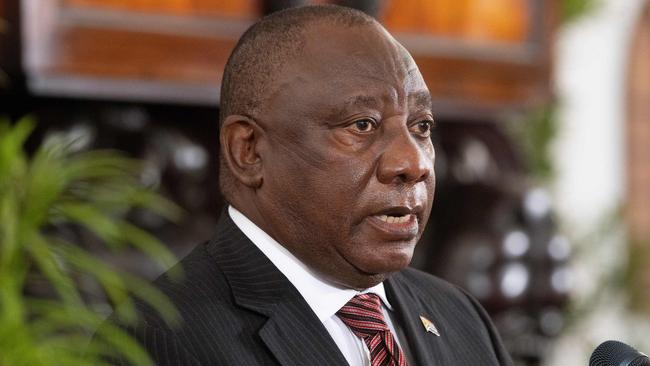
World
Don't miss out on the headlines from World. Followed categories will be added to My News.
China’s complete lockdown of the Covid-ravaged city of Shanghai will cut supply chains, impacting almost all Australian businesses., experts have warned.
Shanghai has the country’s largest seaports, but it sits idle as authorities have ordered the city’s 25 million-plus residents to stay at home.
The lockdown is part of the Chinese Government’s Covid-zero policy, and an attempt to curb rising cases of the Omicron variant in the city.
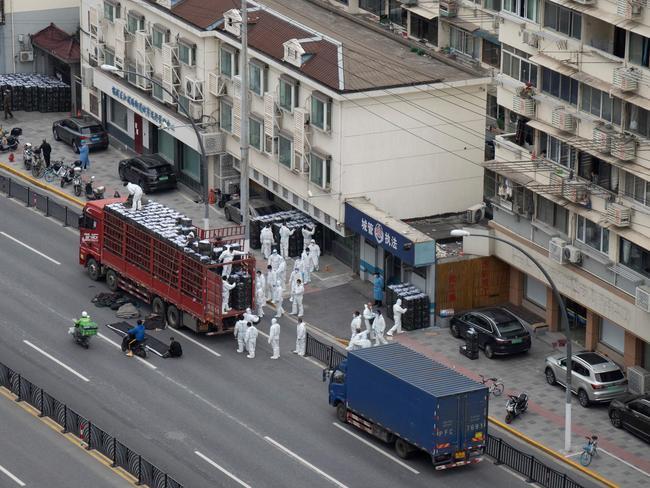
Australian Industry Group CEO Innes Willox has told media the lockdown will put pressure on Australian supply chains across almost every sector of business.
“There had been a marginal improvement over the past few months getting products shipped, as things eased from the worst of the Covid disruptions,” he said.
“What the Shanghai lockdown will do is make it even harder for businesses to get parts and import components.”
Mr Willox said Australia was still very reliant on China for a large number of goods and could expect problems relating to ports, pallets, containers and trucks.
“Further disruption will mean everything from high tech defence equipment right down to even the most basic items you might buy at your local grocery store could be impacted,” he said.
FORCED VACCINE PLAN DEFEATED IN GERMANY IN Covid FREEDOM PUSH
The push for mandatory Covid vaccines suffered a stinging defeat after the German parliament rejected a plan to force jabs for people aged over 60.
It comes after neighbouring Austria dropped its controversial policy of mandatory vaccines in March as governments around the world reject draconian Covid policies; despite the continued emergence of new variants, including a “Frankenstein”-style new Omicron subvariant is spreading in the UK.
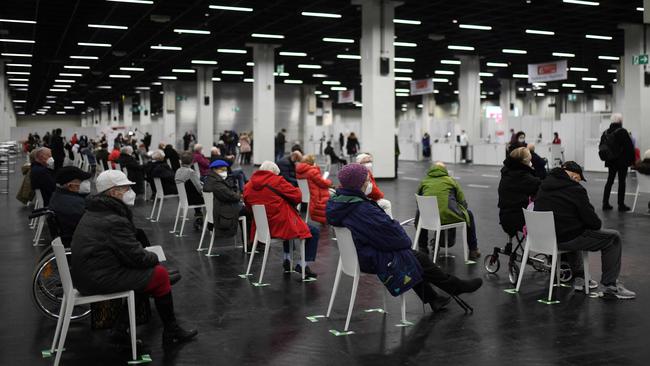
Chancellor Olaf Scholz had proposed touted compulsory jabs for all adults as the surest way out of the pandemic.
Opponents of mandatory jabs meanwhile cite individuals’ freedom to choose.
Only 296 politicians voted in favour, while 378 parliamentarians – including from Scholz’s FDP coalition – cast their ballots against the measure.
“I am naturally disappointed, but the Bundestag has decided”, Scholz told a press conference, adding: “I respect a democratic decision.”
The defeat was all the more embarrassing as the proposal was already significantly watered down to include only those over the age of 60, a smaller group than the originally targeted adult population in general.
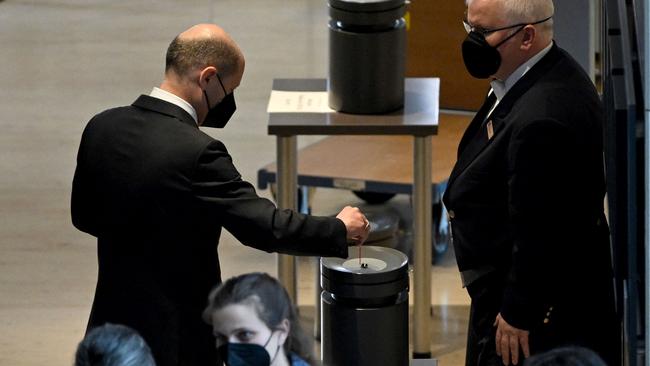
While Covid infections remain high in Germany, the push for jabs in recent weeks has lost momentum as hospitals have been far from overwhelmed.
Germany has also eased most Covid curbs, including lifting a mask requirement in schools and shops, while the public’s attention has also focused on Russia’s invasion of Ukraine.
Around 76 per cent of Germany’s population has received two doses of the vaccine, and 58.9 per cent have also received the booster.
OMICRON SUBVARIANT XE DETECTED
A “Frankenstein”-style new Omicron subvariant is spreading in the UK — and some experts fear the mutation may be the most contagious form yet of Covid.
The XE variant — which has also been confirmed in India and Thailand — is a mix of Omicron’s BA. 1 strain and the new “stealth” BA. 2 form, the Daily Beast reported.
Such mutations are known as “recombinants,” and occur when a person gets infected with two or more variants at a time and they combine “Frankenstein” style, the outlet reported.
A total of 637 cases of the XE recombinant variant have been confirmed in the UK, according to data from the UK Health Security Agency.
The New York Post reported that it was unclear whether XE causes more severe illness or evades vaccines, though early data suggests that it may be more transmissible than earlier forms of the Omicron virus.
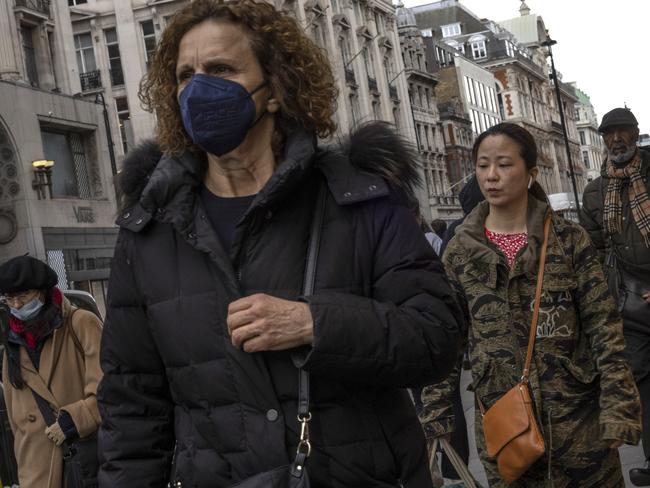
“Early estimates suggest that XE has a community growth rate advantage of 1.1 (which represents a 10 per cent transmission advantage) as compared to BA. 2,” the World Health Organisation said.
Though new Covid cases decreased globally for the second consecutive week, some experts agree that the emerging XE variant has the potential to drive up case numbers.
“From the WHO reports, it does appear to have a bit more of an edge in terms of transmissibility,” Stephanie James, head of a coronavirus testing lab at Regis University in Colorado, told the Daily Beast.
But some experts said it’s still too early to tell whether it will cause surges in cases.
“So far there is not enough evidence to draw conclusions about transmissibility, severity or vaccine effectiveness,” UK Health Security Agency chief medical adviser Susan Hopkins told CNBC.
Other experts said it’s possible that the global population has enough natural immunity from winter surges driven by earlier Omicron variants to lessen the new variant’s impact, the outlet reported.
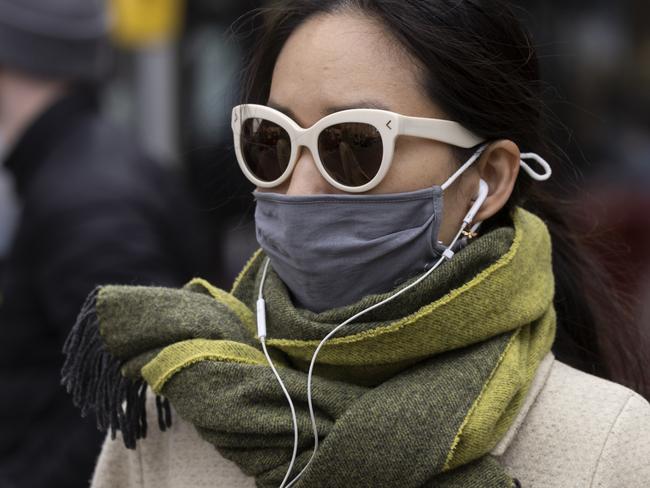
India has detected its first case of the variant, Bloomberg reported. The hybrid strain was discovered in a 50-year-old woman who travelled to Mumbai from South Africa in February.
The woman, who was asymptomatic, was quarantined after being diagnosed in March, according to the report.
XE has also been detected in Thailand, CNBC reported.
The subvariant hasn’t been found in the US yet, but that doesn’t mean it’s not already circulating there, another expert told the Daily Beast.
“It might not be detected by the standard analysis pipeline,” said Rob Knight, head of a genetic computation lab at the University of California-San Diego.
Some health experts told the outlet to expect future subvariants to be identified as well.
“COVID-19 continues,” said public health expert Eric Bortz, who works as a virologist at the University of Alaska-Anchorage.
SHANGHAI REVOLTS AMID LOCKDOWN
Shanghai residents are risking their livelihoods by criticising the Chinese Communist Party’s draconian lockdowns amid growing food shortages and extreme Covid restrictions.
Outrage at video of a pet dog killed in the name of Covid has led people to bypass the government’s great wall of censorship to post video and images on social media.
In one video, a person in a hazmat suit is seen bludgeoning a corgi dog to death in the street because local officials were “afraid of being infected”, according to state-run media.
Other videos showed residents singing expletive-strewn songs aimed at Communist authorities and scuffles with hazmat-suited officials.
People don’t just risk direct reprisals for sharing the videos, they also risk losing “points” from their social credit scores; which can block their access to services and ability to travel.
But already locked down under the country’s aggressive “zero-Covid” strategy and starved by food shortages, residents posted and shared videos that China’s strict censorship hasn’t been able to keep up with.
“That post about the corgi just keeps getting shared on my WeChat moments,” a Shanghai resident said, requesting anonymity for fear of reprisal.
“I think a lot of people are going to be trying to be taking action through petitions and talking to their community … so hopefully the anger and fear turns into something more positive.”
In another dystopia-tinged viral video, a drone whirrs through a housing compound at night broadcasting a message urging residents to “control your soul’s desire for freedom”.
The video was billed as a local government reaction to a Shanghai neighbourhood, which serenaded officials with swearword laden chants in a widely-shared clip.
As seen on Weibo: Shanghai residents go to their balconies to sing & protest lack of supplies. A drone appears: “Please comply w covid restrictions. Control your soul’s desire for freedom. Do not open the window or sing.†https://t.co/0ZTc8fznaVpic.twitter.com/pAnEGOlBIh
— Alice Su (@aliceysu) April 6, 2022
Other viral videos appear to show residents scuffling with hazmat-clad officials and bursting through a barricade onto a street, yelling “we want to eat cheap vegetables!”
Sudden stay-at-home orders have left residents short of fresh food, while delivery apps are overwhelmed each morning as demand surges and many drivers are reportedly off work fearing a positive Covid test could send them into state quarantine.
Some small district in said #Shanghai, a scalable riot broke out. Many screamed "I am starving to death, I am starving to death...!" pic.twitter.com/GyB6gsOiBw
— Northrop Gundam 💙🇺🇦💛 (@GundamNorthrop) April 7, 2022
“I’m starving to death,” people can be heard screaming at authorities, according to translations of video posted online.
Other videos show authorities wearing thermal imaging cameras to see the body heat of residents that may have a fever, like the Predator.
Police in Shanghai now wear thermal-imaging view screen helmets designed to detect people on the streets with fevers. Very Terminator / Borg / Ready Player One metaverse. pic.twitter.com/rPlZ3UXsv6
— Eric Feigl-Ding (@DrEricDing) April 7, 2022
China has refused to abandon its “dynamic zero” Covid strategy of border restrictions, lengthy quarantines and targeted lockdowns, even as new variants test the limits of the policy.
Any shift is unlikely while Beijing touts its pandemic controls as vindication of its right to one-party rule, said Steve Tsang, director of the SOAS China Institute in London.
“Zero-Covid is not just a Party policy, but … a Xi policy”, he said, referring to China’s President Xi Jinping.
“As such it cannot be wrong and cannot be abandoned — at least not until Xi sees its continuation will harm himself or his hold on power.”
Official figures show the vast majority of the more than 100,000 cases in Shanghai in the past month show no symptoms of Covid-19.
Yet tens of thousands of beds have been set up in centres to quarantine the infected.
Officials only softened a policy of splitting Covid-positive children and babies from their virus-free parents after videos of wards full of young kids stoked public outrage.
EUROPE APPROVES FOURTH JAB
The EU medicines watchdog has approved a second Covid booster jab for people aged 80 and over, but said it was too early to make a finding on other age groups.
The announcement by the European Medicines Agency and the European Centre for Disease Prevention and Control came on Wednesday as many countries drop coronavirus measures despite a continued spike in infections.
“A fourth dose (or second booster) can be given to adults 80 years of age and above after reviewing data on the higher risk of severe Covid-19 in this age group and the protection provided by a fourth dose,” a combined EMA and ECDC statement said.
However a combined EMA-ECDC task force have concluded that it is too early to consider using a fourth vaccine dose to he general population, they said.
There is currently no clear evidence that immunity is waning in people aged 60 to 79 with normal immune systems “and thus no clear evidence to support the immediate use of a fourth dose”.
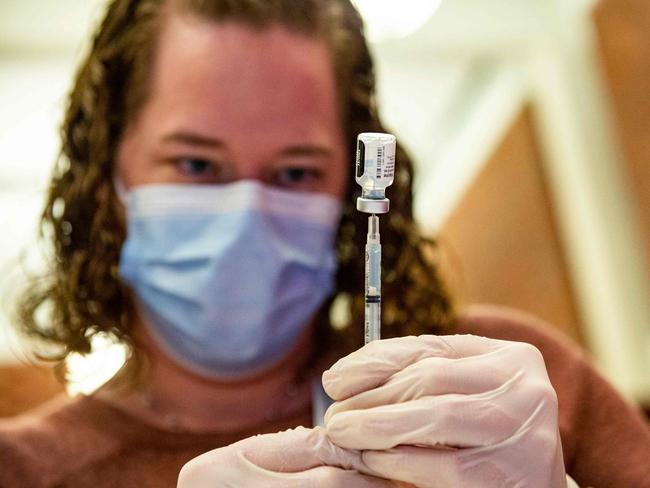
“If the current epidemiological situation changes and new signals emerge, it may become necessary to consider a fourth dose in this age group,” the agencies said.
“For adults below 60 years of age with normal immune systems, there is currently no conclusive evidence that vaccine protection against severe disease is waning or that there is an added value of a fourth dose,” they said.
More than two years into the pandemic, which has officially caused more than six million deaths — with the true figure believed to be several times as high — the resurgence in cases can mainly be blamed on the spread of infectious sub-lineages of the Omicron variant, particularly BA. 2, the EMA said last month.
The regulator has so far approved five vaccines for use in the EU: Pfizer, Moderna, AstraZeneca, Johnson & Johnson and Novavax.
‘EXTREMELY GRIM’: CITY OF 26M HIT WITH Covid OUTBREAK
Chinese authorities have admitted that the latest Covid-19 outbreak in the country’s largest city and financial centre of Shanghai remains “extremely grim” as more than 26 million people remain in lockdown.
China reported more than 20,000 Covid-19 cases on Wednesday, the highest daily tally since the start of the pandemic.
In a major test of China's zero-tolerance strategy to eliminate the virus, the government widened the lockdown to eastern parts of Shanghai and extended until further notice restrictions in western districts, which had been due to expire on Tuesday.
Director of Shanghai’s working group on epidemic control Gu Honghui admitted that the outbreak in the city was “still running at a high level”.
“The situation is extremely grim,” Mr Honghui told state media.
More than 38,000 health workers from 15 provinces have been sent to Shanghai to help fight the outbreak, state broadcaster CCTV reported Monday, quoting the Ministry of Health.
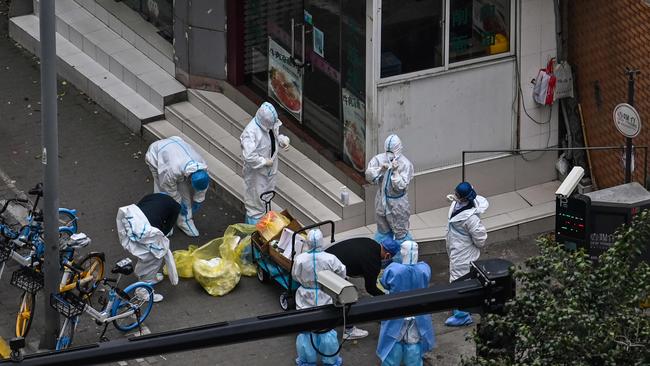
Most of eastern Shanghai, which was supposed to reopen last Friday, remained locked down along with the western half of the city.
Shanghai health officials on Monday defended separating babies and young children from their parents if they test positive for Covid-19, as frustration at the city’s tough virus controls builds.
It’s the latest move by authorities try to snuff out the country’s most severe virus outbreak since the end of the first pandemic wave in early 2020.
Under China’s unbending virus controls, anyone found positive — even if they are asymptomatic or have a mild infection — must be isolated from non-infected people.
That includes children who test positive but whose family members do not, health officials confirmed on Monday, defending a policy which has spread anxiety and outrage across the city.
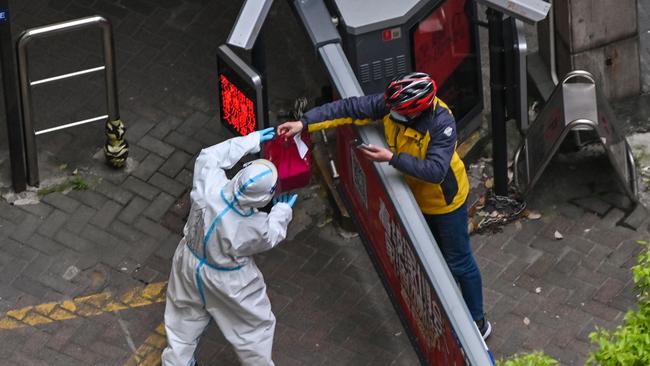
“If the child is younger than seven years old, those children will receive treatment in a public health centre,” Wu Qianyu, an official from the Shanghai Municipal Health Commission, on Monday said.
“For older children or teenagers … we are mainly isolating them in centralised (quarantine) places.”
Parents and guardians voiced their anger at the policy on social media.
“Parents need to meet ‘conditions’ to accompany their children? That’s absurd … it should be their most basic right,” one unnamed commenter wrote on social media platform Weibo.
Authorities initially promised not to lock down the whole city, instead targeting virus clusters with localised lockdowns of specific compounds or districts.
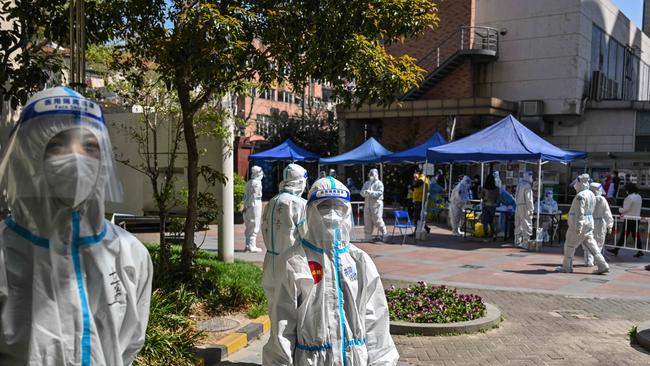
After weeks of growing case numbers, city officials last week gave a rare admission of failure of their tactics. They introduced a two-stage lockdown, initially billed as lasting four days each to mass test both sides of the city.
And as lockdown continues several days on, residents fear they are under a prolonged stay-at-home order by stealth, unable to exercise outside or walk dogs and with limited access to fresh food.
While the confinement was in theory set to be lifted Tuesday, the Shanghai government’s official WeChat account said it would stay in place due to the high number of positive cases detected.
Until March, China had successfully kept the daily caseload down to double or triple digits, with harsh localised lockdowns, mass testing and travel restrictions.
SOUTH AFRICA ENDS Covid ‘STATE OF DISASTER’
South Africa has officially ended its national “state of disaster” over the coronavirus pandemic, which had been in effect for 750 days and allowed the government to impose some of the broadest public health restrictions in the world.
President Cyril Ramaphosa on Monday announced that all Covid-19 pandemic legal restrictions would end at midnight, declaring it was time to resume growing the economy.
Ramaphosa said his country, which is the hardest hit on the continent, has seen death rates plunge from an average daily high of 420 in July last year to just 12 in the past week.
Government “decided to terminate the national state of disaster with effect from midnight tonight” which has been in place since March 15, 2020, he said in a televised address.
“We are hopeful that the worst is behind us, and we are confident that there are only better days ahead.
“Now is the time to grow our economy and create jobs … to get our country back on track.
“Now is the time to heal, to recover and to rebuild,” he said in a televised address to the nation.
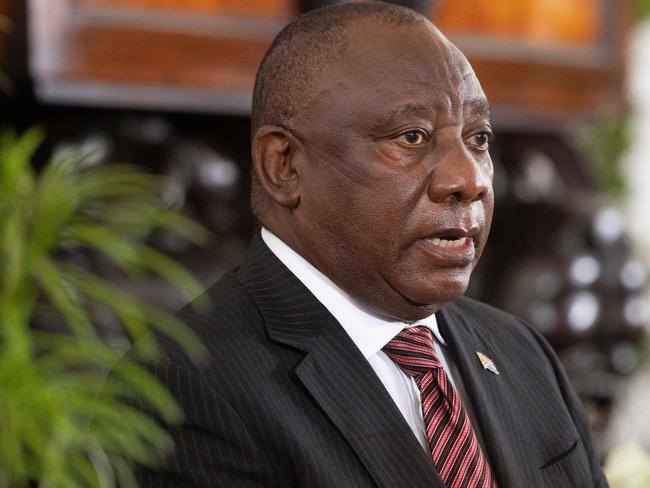
South Africa’s already struggling economy was worsened by the pandemic, with unemployment rate rising to a record 35.3 per cent during the last three months of 2021.
“Although the pandemic is not over, and although we continue to remain cautious, we can be confident that we are in a better position now than we have been at any other time over the last 750 days,” said Ramaphosa.
However some “transitional” measures such as mask-wearing in indoor spaces will remain in place for the next 30 days.
South Africa is the continent’s most infected, counting more than 3.7 million coronavirus cases or more than 30 per cent of Africa’s over 11.3 million cases.
So far 100,052 Covid-related deaths have been recorded, but researchers say the actual fatalities could be triple the reported figures.
On Monday it recorded 685 cases and just two deaths.
Originally published as Covid-19 world updates: China’s Covid-zero lockdown to hit Aussie supply chains


